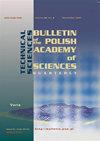基于神经网络学习系统的固定式超级电容器储能运行算法
IF 1.1
4区 工程技术
Q3 ENGINEERING, MULTIDISCIPLINARY
Bulletin of the Polish Academy of Sciences-Technical Sciences
Pub Date : 2023-11-06
DOI:10.24425/BPASTS.2020.134176
引用次数: 5
摘要
本文提出了一种用于预测直流牵引变电所运行的固定式超级电容器储能系统的最低荷电状态(SoC)水平并随时间变化的算法。这样做是为了确保列车在制动时最大限度地回收能量。详细介绍了超级电容器储能系统的模型、运行算法和最小电荷状态的预测;给出了主要公式、图形和仿真结果。建议将荷电状态曲线划分为相等的时间段,在此时间段内保持最小电荷状态不变。为了预测后续阶段的SoC水平,可以使用基于神经网络的学习算法。然后,最小荷电状态可以基于两种基本类型的数据:第一种是前一时段储能负荷的时间分布,保持恒定的最小荷电状态;第二种是依赖于前一时段列车的位置和速度值。实验证明,使用可变最小SoC可确保回收的能量体积增加约10%。并给出了神经网络的最优结构和激活函数。本文章由计算机程序翻译,如有差异,请以英文原文为准。
Stationary supercapacitor energy storage operation algorithm based on neural network learning system
The paper proposes to apply an algorithm for predicting the minimum level of the state of charge (SoC) of stationary supercapacitor energy storage system operating in a DC traction substation, and for changing it over time. This is done to insure maximum energy recovery for trains while braking. The model of a supercapacitor energy storage system, its algorithms of operation and prediction of the minimum state of charge are described in detail; the main formulae, graphs and results of simulation are also provided. It is proposed to divide the SoC curve into equal periods of time during which the minimum states of charge remain constant. To predict the SoC level for the subsequent period, the learning algorithm based on the neural network could be used. Then, the minimum SoC could be based on two basic types of data: the first one is the time profile of the energy storage load during the previous period with the constant minimum SoC retained, while the second one relies on the trains’ locations and speed values in the previous period. It is proved that the use of variable minimum SoC ensures an increase of the energy volume recovered by approximately 10%. Optimum architecture and activation function of the neural network are also found.
求助全文
通过发布文献求助,成功后即可免费获取论文全文。
去求助
来源期刊
CiteScore
2.80
自引率
16.70%
发文量
0
审稿时长
6-12 weeks
期刊介绍:
The Bulletin of the Polish Academy of Sciences: Technical Sciences is published bimonthly by the Division IV Engineering Sciences of the Polish Academy of Sciences, since the beginning of the existence of the PAS in 1952. The journal is peer‐reviewed and is published both in printed and electronic form. It is established for the publication of original high quality papers from multidisciplinary Engineering sciences with the following topics preferred:
Artificial and Computational Intelligence,
Biomedical Engineering and Biotechnology,
Civil Engineering,
Control, Informatics and Robotics,
Electronics, Telecommunication and Optoelectronics,
Mechanical and Aeronautical Engineering, Thermodynamics,
Material Science and Nanotechnology,
Power Systems and Power Electronics.

 求助内容:
求助内容: 应助结果提醒方式:
应助结果提醒方式:


